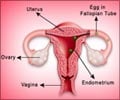A progestogen-only treatment halted bleeding in women suffering from extremely heavy periods, new research has found.

Within five days of receiving the therapy, bleeding had ceased in 44 of the 48 women in the study, and the other four were only experiencing spotting. The mean time to bleeding cessation was 2.6 days, leading the researchers to conclude the progestogen-only treatment was an effective short-term therapy for acute abnormal uterine bleeding.
In the pilot study, the patients received a 150-milligram injection of Depomedroxyprogesterone acetate (DMPA) and then were given medroxyprogesterone acetate (MPA) 20 milligram pills that were to be taken orally every eight hours for three days.
"This is the largest prospective study to date to measure the effectiveness of a proposed hormonal treatment for excessive uterine bleeding," said Dr. Nelson. "The women in the study experienced excellent success with this relatively low dose progestogen-only therapy. This therapy also has the potential for offering longer-term protection than prior therapies."
The therapy was shown to halt bleeding rapidly while appropriate testing could identify the underlying causes of the excessive bleeding. As such, Dr. Nelson said the therapy provides a "temporary bridge to long-term targeted therapies." She also said the regimen had "good compliance, few side effects and high patient satisfaction." In addition, she said it was an attractive treatment option for women with contraindications to estrogen, those who need more prolonged therapy and those who may have difficulty with daily pill administration.
Advertisement








